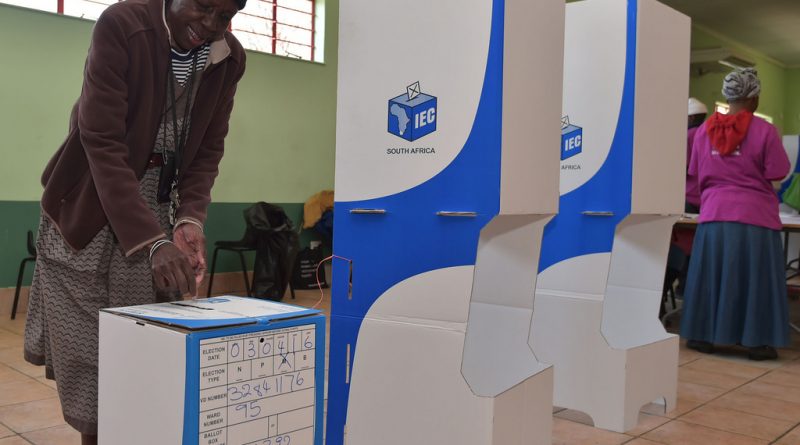South Africa to Hold General Elections in May
Brian Hilyard
Staff Writer
After much anticipation, it was announced that South Africa will hold its 2019 General Elections on May 8, reports africanews. Voters will head to the polls to elect a new National Assembly, and all the Provincial Legislatures are on the ballot as well.
This will be South Africa’s sixth democratic General Election since adopting complete adult suffrage. According to The Telegraph, it will also be the first election since the largely unpopular Jacob Zuma, who accumulated over 700 charges of corruption, fraud, racketeering and money laundering during his presidency, was ousted by his own party, the African National Congress (ANC), last February. Now, the newly appointed president, Cyril Ramaphosa, will be the one leading the ANC into the May elections.
During the final days of Zuma’s presidency, the ANC looked as if they would get battered during the next general elections, with an Ipsos poll indicating only 47 percent of voters were planning on voting for them at the time. This was a massive pitfall for the party that has enjoyed simple or super majorities in the National Assembly and in every Provincial Legislature, except for the Western Cape, since the 1994 elections. They received 62.2 percent of the vote during the 2014 General Election and only 54 percent during the 2016 Local Government Elections. However, President Ramaphosa’s incredible popularity had propelled his party to new heights; being able to expect at least 61 percent of the vote in May according to an additional Ipsos poll conducted in late 2018.
According to the same Ipsos poll, the ANC’s most prominent rival, the Democratic Alliance, who promote classical liberalism, was expected to get about 14 percent of the vote, a fall from the 22 percent they received in 2014. The Economic Freedom Party (EFF), who espouse Communist and Ethnonationalist policies, are set to receive 9 percent, up from 6.4 percent. The May elections will be only the second General Election in which they have participated. The EFF used to be the ANC’s youth wing. If this prediction were to hold true, this election would simply maintain the status quo that has existed since 1994.
However, two massive eruptions within state-operated entities came to public attention in early February that not only threaten to demolish the ANC’s political prospects, but the entire country’s economy itself.
Additionally, Bloomberg reports that Public Investment Corp is responsible for $150 billion of retirement funds for 1.2 million government workers and was discovered to be mismanaging its funds. Those running the company have been paying inflated prices for assets as political or personal favors. It has not had any returns on investment since 2013 and the deficit is estimated to be in the tens of billions.
To make matters worse, Public Investment Corp holds 20 percent of all of Eskom’s outstanding bonds, one-fifth of South African-listed bonds (half of South Africa’s debt is due to backing Eskom’s debt), and nearly 10 percent of the Johannesburg benchmark stock index. The government simply cannot afford to bailout both entities, as the nation’s debt-to-GDP ratio has swollen to 53.1 percent from 31.3 percent in the past 10 years while averaging a deficit-to-GDP ratio of 4.6 percent over the same period, according to Trading Economics.
No solution currently exists for Public Investment Corp at this time. Yahoo News reports that the planned solution for Eskom was announced by their Finance Minister, Tito Mboweni, in front of lawmakers in Cape Town. This plan includes a government bailout worth $4.9 billion over the next three years to keep the company afloat as it is restructured. This will require the debt ceiling to be raised, and the national deficit be raised to 4.5 percent of GDP from a previous estimate of about 4 percent. It will also be broken into three separate companies: generation, distribution, and transmission.
The timing for this restructuring could not have been worse as Moody’s Investor Service is due to reevaluate the country’s credit rating by March 29. As explained by The New York Times, it is the last of the big three credit raters to have the country within “investment worthy” territory. If Moody’s decides to drop its credit rating for South Africa by just one rating, it will stray into “junk” territory, which may spook foreign investors who the country is extremely reliant on for economic growth.
Investors were already worried with South Africa’s economy as it hasn’t grown by more than 2 percent since 2013, and its unemployment rate of 27 percent remains near a 15-year high. Now, they must factor in increased government expenditure, a decreased projection for economic growth, and a weakening currency. The Rand was trading at 13.25 to one dollar on February 1 and is now trading at 14.13 to one dollar. These bombshells affect the ANC’s most loyal supporters: government workers and union members. According to Bloomberg, both groups are now raising questions about the ANC’s competence to run the country.
There is a real possibility that the ANC will lose a simple majority in the National Assembly come May, which will delve South African politics into coalition agreements for the first time at the national level.
A possible outcome is that the ANC could form a coalition with the EFF, the party investors worry about most as they promote similar policies that caused the collapse of Zimbabwe’s economy: confiscation of land without compensation and the printing of money to “make everyone rich.”
EFF leader Julius Malema has also been quoted on Danish TV saying, “We are not calling for the slaughter of white people in South Africa, at least for now…I can’t control the future.” Current president Ramaphosa must pull off a miracle to keep the ANC in power and to save the economy. He only has six weeks.


